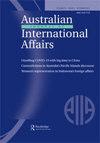压力的极限:中国对韩国萨德的有限经济胁迫
IF 1.8
3区 社会学
Q2 INTERNATIONAL RELATIONS
引用次数: 0
摘要
摘要在经济相互依存的背景下,韩国和其他与中国贸易关系不对称的国家一样,经常被其公民视为容易受到中国利用经济力量获取政治影响力的影响。然而,韩国部署末段高空区域防御系统(THAAD)对韩国的脆弱性提供了相反的看法。尽管中国对韩国企业采取了强制性政策,并对韩国经济施加了巨大影响,但中国未能就韩国部署萨德的决定做出让步。问题是为什么?根据2016-17年韩国和中国之间的萨德危机,我认为强制权力的影响将取决于强制国家支付成本的意愿、目标国家的国家水平以及与政策相关的利益的相对强度。这一案例研究有助于我们了解中国对目标国家使用经济胁迫可能取得成功的情况。本文章由计算机程序翻译,如有差异,请以英文原文为准。
The limits of pressure: China’s bounded economic coercion in response to South Korea’s THAAD
ABSTRACT In the context of economic interdependence, South Korea, like other countries with asymmetrical trade relations with China, is often seen by its citizens as vulnerable to China’s use of economic power to gain political influence. However, South Korea’s deployment of the THAAD (Terminal High Altitude Area Defense) offers the opposite perspective on South Korea’s vulnerability. Despite China’s coercive policies against South Korean businesses and great leverage over Korea’s economy, China failed to generate a concession regarding Korea’s decision to deploy the THAAD. The question is why? Drawing on the 2016–17 THAAD crisis between South Korea and China, I argue that influence of coercive power will depend on the coercive state’s willingness to pay a cost, the target state’s level of stateness, and the relative intensity of interests related to the policy. This case study helps us understand the circumstances under which China’s use of economic coercion against target countries may be successful.
求助全文
通过发布文献求助,成功后即可免费获取论文全文。
去求助
来源期刊

Australian Journal of International Affairs
INTERNATIONAL RELATIONS-
CiteScore
3.20
自引率
13.30%
发文量
44
期刊介绍:
AJIA is the journal of the Australian Institute of International Affairs. The Institute was established in 1933 as an independent and non-political body and its purpose is to stimulate interest in and understanding of international affairs among its members and the general public. The aim of the Australian Journal of International Affairs is to publish high quality scholarly research on international political, social, economic and legal issues, especially (but not exclusively) within the Asia-Pacific region. The journal publishes research articles, refereed review essays and commentary and provocation pieces. ''Articles'' are traditional scholarly articles. ‘Review essays’ use newly published books as the basis to thematically examine current events in International Relations. The journal also publishes commentaries and provocations which are high quality and engaging pieces of commentary, opinion and provocation in a variety of styles. The Australian Journal of International Affairs aims to analyse international issues for an Australian readership and to present Australian perspectives to readers in other countries. While seeking to stimulate interest in and understanding of international affairs, the journal does not seek to promote any particular policies or approaches. All suitable manuscripts submitted are sent to two referees in a full ''double blind'' refereeing process.
 求助内容:
求助内容: 应助结果提醒方式:
应助结果提醒方式:


